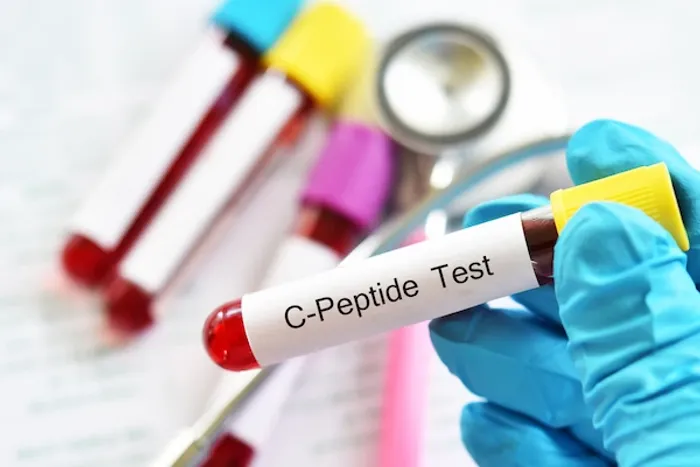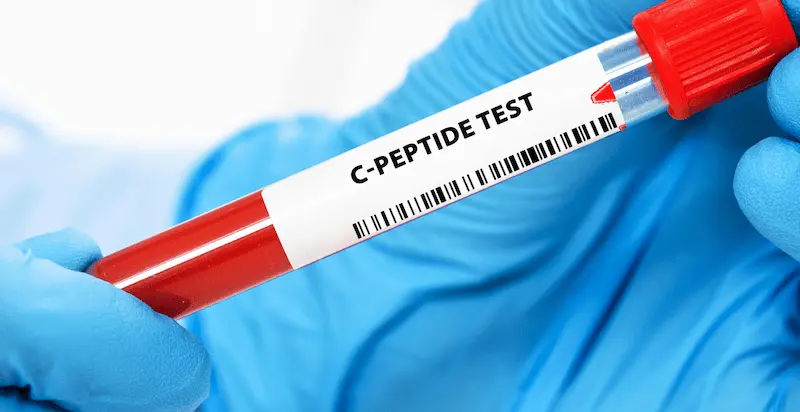Guide to C Peptide Test Normal Range
Understand the C-Peptide test, its normal range, and how it helps assess insulin production and diabetes management for better health monitoring.

Written by Dr. Siri Nallapu
Reviewed by Dr. Shaik Abdul Kalam MD (Physician)
Last updated on 8th Sep, 2025

Before we can understand the test, we need to understand what C Peptide is. Think of your pancreas as a factory and insulin as its most important product. This factory doesn't produce insulin directly; instead, it creates a larger precursor molecule called proinsulin. When your body needs insulin to manage blood sugar, it splits this proinsulin into two parts: one active insulin molecule and one C Peptide molecule.
For every molecule of insulin released into your bloodstream, an equal molecule of C Peptide is released alongside it. This makes C Peptide an incredibly reliable marker—a mirror image of your body's own insulin production.
Why Would You Need a C Peptide Test?
A doctor typically orders a C Peptide test for several specific reasons, all centered on understanding how well your pancreas is working.
Differentiating Between Type 1 and Type 2 Diabetes
This is one of the most common reasons for the test. In Type 1 diabetes, the immune system attacks and destroys insulin-producing beta cells. This results in very little to no insulin production and, consequently, very low or undetectable C Peptide levels. In Type 2 diabetes, the body often produces insulin (and C Peptide) normally or even at high levels initially, but the body becomes resistant to its effects. A C Peptide test helps confirm which type of diabetes a person has, which is critical for determining the correct treatment plan.
Investigating Hypoglycemia (Low Blood Sugar)
Unexplained episodes of low blood sugar (hypoglycemia) can be dangerous. The test helps determine the cause. A high C Peptide level during a hypoglycemic episode suggests the body is producing too much insulin internally, potentially due to an insulinoma (a rare insulin-producing tumor) or other conditions. A low C Peptide level during hypoglycemia indicates the cause is likely exogenous (from outside the body), such as an overdose of diabetes medication or insulin.
Monitoring Diabetes Treatment and Beta Cell Function
In some cases, the test is used to monitor the remaining function of beta cells in someone with type 1 diabetes or to see if a type 2 diabetic's pancreas is still producing insulin over time. This can inform decisions about treatment strategies.
Consult a Top Specialist
Understanding the C Peptide Test Normal Range
The normal range for C Peptide can vary slightly between different laboratories based on the equipment and chemicals they use. Therefore, it's essential to refer to the specific reference range provided on your own lab report. However, a general guideline is provided below.
Measurement units are typically nanograms per milliliter (ng/mL) or nanomoles per liter (nmol/L). The following table represents common reference ranges.
Normal Range Table (Fasting vs. Stimulated)
Factors That Can Influence Your C Peptide Level
It's important to remember that the normal range is a guide. Your value can be influenced by:
- Kidney Function: C Peptide is cleared from the body by the kidneys. Impaired kidney function can lead to higher levels of C Peptide because it isn't being excreted properly.
- Body Mass Index (BMI): Higher BMI is often associated with higher C Peptide levels due to insulin resistance.
- Age and Gender: Levels can vary slightly with age and gender.
Interpreting Your Results: High, Low, and Normal Levels
So, what does your result mean? Always discuss your results with a doctor for a definitive diagnosis.
What Does a High C Peptide Level Mean?
A high C Peptide level indicates that your body is producing a large amount of insulin. This is commonly seen in:
- Type 2 Diabetes: Especially in the early stages, where the pancreas is overworking to overcome insulin resistance.
- Insulin Resistance: A condition where cells don't respond well to insulin, prompting the pancreas to produce more.
- Insulinoma: A tumor of the pancreas that produces insulin uncontrollably.
- Kidney Disease: As mentioned, impaired kidney function can cause levels to rise.
- Cushing's Syndrome: A disorder involving high levels of cortisol, which can promote insulin resistance.
What Does a Low C Peptide Level Mean?
A low C Peptide level indicates that your body is producing very little insulin. This is typically associated with:
- Type 1 Diabetes: Where the insulin-producing beta cells have been destroyed.
- Advanced Type 2 Diabetes: After many years, the overworked beta cells can "burn out" and stop producing insulin.
- Taking Excessive Diabetes Medication: External insulin or medications that stimulate insulin secretion can suppress the pancreas's own production.
- Addison's Disease: A disorder involving insufficient cortisol production.
How to Prepare for Your C Peptide Blood Test
Preparation is straightforward. Your doctor will likely instruct you to fast (not eat or drink anything except water) for 8 to 12 hours before the test. This ensures a baseline measurement. You may also be asked to temporarily stop certain medications that could influence the results. Be sure to inform your doctor of all medications and supplements you are taking. The test itself is a simple blood draw from a vein in your arm. If you're investigating hypoglycemia, the blood draw may be timed to coincide with your symptoms.
Get Your Health Assessed
Conclusion
Understanding your C Peptide test and its normal range empowers you to take an active role in your metabolic health. This test provides a unique glimpse into the functional capacity of your pancreas, offering clarity for diagnosis and guiding effective treatment strategies for diabetes and blood sugar disorders. Remember, a lab value is a snapshot in time, and its true meaning is unlocked when combined with your overall clinical picture. If your test results fall outside the standard normal range, view it as a starting point for a deeper conversation with your doctor. They can help you understand the underlying causes and work with you to develop a plan to manage your health effectively. If you have concerns about your blood sugar levels or have received abnormal test results, consulting a doctor online with Apollo24|7 can provide timely advice and guidance on the next steps.
Consult a Top Specialist
Consult a Top Specialist

Dr. Jawwad Mohammed Kaleem
General Practitioner
4 Years • MBBS
Hyderabad
Apollo 24|7 Clinic, Hyderabad

Dr. Hrishikesh Shivakumar
General Physician/ Internal Medicine Specialist
9 Years • MBBS, MD (GENERAL MEDICINE)
Bangalore
Apollo 24|7 Clinic - Karnataka, Bangalore
(75+ Patients)

Dr. Suraja Nutulapati
General Physician/ Internal Medicine Specialist
10 Years • MBBS, MD (Internal Medicine)
Hyderabad
Apollo 24|7 Clinic, Hyderabad
(975+ Patients)

Dr. Chaithra H
General Physician/ Internal Medicine Specialist
6 Years • MBBS, MD General Medicine, DNB General Medicine
Bangalore
Apollo 24|7 Clinic - Karnataka, Bangalore

Dr D M Karthik
General Practitioner
4 Years • MBBS, Fellowship in Diabetes Mellitus, Advance certificate in Diabetes Mellitus, Derma Nutrition Certification
Visakhapatnam
Apollo 24|7 Clinic - Andhra Pradesh, Visakhapatnam
Consult a Top Specialist

Dr. Jawwad Mohammed Kaleem
General Practitioner
4 Years • MBBS
Hyderabad
Apollo 24|7 Clinic, Hyderabad

Dr. Hrishikesh Shivakumar
General Physician/ Internal Medicine Specialist
9 Years • MBBS, MD (GENERAL MEDICINE)
Bangalore
Apollo 24|7 Clinic - Karnataka, Bangalore
(75+ Patients)

Dr. Suraja Nutulapati
General Physician/ Internal Medicine Specialist
10 Years • MBBS, MD (Internal Medicine)
Hyderabad
Apollo 24|7 Clinic, Hyderabad
(975+ Patients)

Dr. Chaithra H
General Physician/ Internal Medicine Specialist
6 Years • MBBS, MD General Medicine, DNB General Medicine
Bangalore
Apollo 24|7 Clinic - Karnataka, Bangalore

Dr D M Karthik
General Practitioner
4 Years • MBBS, Fellowship in Diabetes Mellitus, Advance certificate in Diabetes Mellitus, Derma Nutrition Certification
Visakhapatnam
Apollo 24|7 Clinic - Andhra Pradesh, Visakhapatnam
Frequently Asked Questions
What is a good C Peptide level?
A 'good' C Peptide level is one that falls within the normal range for your specific lab and is appropriate for your clinical situation. For a healthy individual, a fasting level between 0.8 and 3.1 ng/mL is typical. For someone with diabetes, a detectable level might be 'good' as it indicates some remaining pancreatic function.
Can you have a normal C Peptide level and still have diabetes?
Yes. This is very common in the early stages of Type 2 diabetes. The pancreas is often producing normal or even high amounts of insulin (reflected by a normal/high C Peptide), but the body's cells are resistant to its effects, leading to high blood sugar.
How is the C Peptide test different from an insulin test?
They measure different things. The C Peptide test measures your body's own insulin production. The insulin test measures the total insulin in your blood, which includes both insulin produced by your body and insulin injected from outside. C Peptide is generally a more reliable indicator of endogenous secretion.
What does it mean if my C Peptide is low but my blood sugar is high?
This combination strongly suggests Type 1 diabetes or advanced Type 2 diabetes where your pancreas is no longer able to produce enough insulin to control your blood glucose levels. This result typically means you will require insulin therapy.
Is fasting required for a C Peptide test?
In most cases, yes. A fasting C Peptide test (8-12 hours with no food) provides the most consistent and interpretable baseline measurement. Your doctor will give you specific instructions based on the reason for your test.

